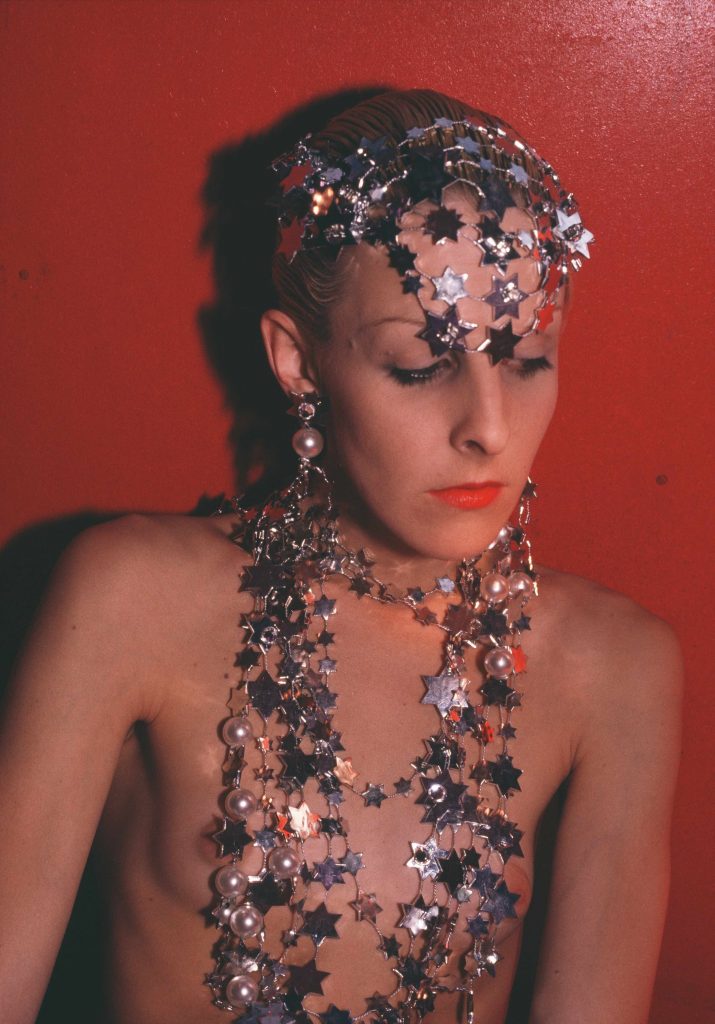Marian Goodman Gallery, London

Although Memory Lost, the centre piece of Sirens, Nan Goldin’s first solo exhibition for 12 years looks backwards, comprising old work both previously seen and unseen, it’s far from being a simple retrospective – and it’s clear why Goldin herself considers it to be a major fresh work.
Memory Lost is a 45-minute slideshow of pictures, music and dialogue, the main theme of which is addiction.
The slideshow format – a la her ground breaking work The Ballad of Sexual Dependency – is perfect for Goldin’s oeuvre. Images pulse and disappear: a flickering zoetrope of pictures – almost ephemeral – like a drug rush, a hit; easy come easy go easy come again.
We see:-
… Cookie Mueller, smouldering with a certain confused impatience… drugs…
religious icons (kitsch – the chosen iconography style of melodrama and excess), milk/water flowing from a statuette’s breasts…
It’s also a fast flow of feelings; as if to maintain that it isn’t actually true that life isn’t worth living unless you pause now and then to reflect that you are alive.
… a drooping, withered Xmas tree … messy hotel rooms… wrecked rooms (hurried visits to scenes of palpable despair)… disturbing self-portraits (a molten/bemused quality in her eyes, as though she had seen or imagined bad sad things – especially in the mirror, perhaps)…
The show is carried by the type of rhythm that opens up the borders of slippery psychological complexity.
… New York City… the projects… a horrific slit wrist… drugs… a drug neighbourhood… a shitty mattress ruined by a large ‘fall-unconscious-with-a-cigarette’ hole burnt all the way through, springs and wires exposed like nerves…
Uptown and downtown, art and fame, sex and money all blurred together like wild forces we can’t control.
… pills in an open safe …
It’s a revelation, almost traumatic – art that feels like a physical sensation. Emotions drift like the swirls in a drug user’s spoon.
The visuals are underpinned by a haunting, doleful new score by composer Mica Levi, which takes the dread to the next level. The dialogue, comprising phone messages and snippets of conversations, overlays the music and the pictures with musings and utterances benumbed – from or about people who, at some point, have lost the thread of the track of their own lives:-
… coke or dope… wake up…wake up…wake up… wake up… in mom’s arms, that’s where I felt safe and secure… I would put ‘dead’ by people’s names but then there were so many I gave up… are you OK? Call me. Are you eating? What’s happening? … I couldn’t leave the house – the beautiful leaves turning making me … it must be the fall … the fall… just trying not to feel anything… you don’t ever belong… took the money and keys and left me in the room for five days – I couldn’t get drugs and it was like being buried alive… he doesn’t know how to cry anymore – just makes noises… connection – that’s what people are looking for in addiction…
Goldin came to prominence by presenting, with bravery, empathy and downbeat pizzazz, the ‘holy moment’ of photography, when the camera’s gaze alights on the real, however provocative it may be: fixed, unspeakable reality. Fixed and unspeakable perhaps because, as writer Ann Marlowe says, addiction – and it was always there in the background – stops time – physically, emotionally, philosophically – it is ‘a form of mourning for irrecoverable glories’. In other words, nostalgia in its most alarming form – one which ‘stops your passage to the future’.
In this respect, Memory Lost is anything but nostalgic. Instead – and this is the point – it reframes, recasts, recalibrates the past in order to present an arc. That of the subjects who embody Memory Lost’s theme – it recognises that head, heart and psyche of the drug user is either filled with light or horror, depending on the point travelled on the spiral. And that of the artist herself – asserting that memory is not a fixed concept and that we can and do recontextualize to make sense of a given narrative – and it’s this that offers nothing less and nothing more than a sense of fresh possibility.
The final proper frame of Memory Lost is simply a dedication to the activist group P.A.I.N. (Prescription Addiction Intervention Now), organized by Nan Goldin to address the opioid crisis.
The exhibition continues until 11 January, 2020
Richard Cabut
